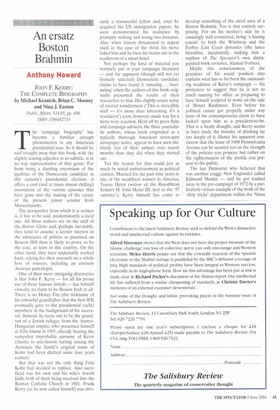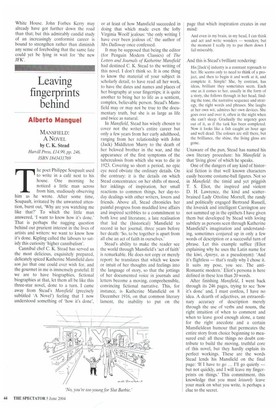An ersatz Boston Brahmin
Anthony Howard
JOHN E KERRY: THE COMPLETE BIOGRAPHY by Michael Kranish, Brian C. Mooney and Nina J. Easton
Public Affairs, $14.95, pp. 948, ISBN 1586982734
The 'campaign biography' has become a familiar enough phenomenon in any American presidential year. So it should be said straight away that this book, with the slightly teasing adjective in its subtitle, is in no way representative of that genre. Far from being a dazzling encomium of the qualities of the Democratic candidate in this autumn's presidential election, it offers a cool (and at times almost chilling) assessment of the various episodes that have gone into the making of the career of the present junior senator from Massachusetts.
The perspective from which it is written is, it has to be said, predominantly a local one. All three authors are on the staff of the Boston Globe and, perhaps inevitably, they tend to assume a keener interest in the intricacies of politics as practised on Beacon Hill than is likely to prove to be the case, at least in this country. On the other hand, they have undeniably worked hard, relying for their research on a whole host of sources, including an eminent Austrian genealogist. One of their more intriguing discoveries is that John F. Kerry for all his proud use of those famous initials — has himself virtually no claim to be Boston Irish at all. There is no Honey Fitz (the nickname of his colourful grandfather that the first JFK eventually gave to the presidential yacht) anywhere in the background of his successor. Instead, he turns out to be the grandson of a Jewish refugee from the AustroHungarian empire, who presented himself at Ellis Island in 1905, already bearing the somewhat improbable surname of Kerry (thanks to anti-Jewish feeling among the Austrians the family's original name of Kohn had been ditched some four years earlier).
But that was not the only thing Fritz Kohn had decided to replace. Also sacrificed was his own and his wife's Jewish faith, both of them being received into the Roman Catholic Church in 1901. Frank Kerry (as he now called himself) was obvi
ously a resourceful fellow and, once he acquired his US immigration papers, he soon demonstrated his resilience by promptly making and losing two fortunes. Alas, when history threatened to repeat itself in the case of the third, his nerve failed him and he blew his brains out in the washroom of a smart hotel.
Not perhaps the kind of material you normally put in your campaign literature — and the apparent (though still not yet formally selected) Democratic candidate claims to have found it 'amazing .., fascinating' when the authors of this book originally presented the results of their researches to him. His slightly ersatz sense of excited wonderment (This is incredible stuff — it's more than interesting, it's a revelation') soon, however, made way for a more wary reaction. Held off by press flaks and campaign advisers, the three journalistic authors, whose book originated as a typically thorough American seven-part newspaper series, appear to have seen distinctly less of their subject over recent months than they did when they started out.
Yet the reason for that could just as much be social embarrassment as political caution. Married for the past nine years to one of the wealthiest women in America, Teresa Heinz (widow of the Republican Senator H. John Heinz III, heir to the '57 varieties.), Kerry himself has come to
develop something of the aloof aura of a Boston Brahmin. Nor is that entirely surprising. For on his mother's side he is amazingly well connected, being 'a kissing cousin' to both the Winthrop and the Forbes East Coast dynasties (the latter bloodline, incidentally, making him a nephew of The Spectator's own distinguished book reviewer, Alastair Forbes). Maybe this consciousness of the grandeur of his social position also explains what has so far been the outstanding weakness of Kerry's campaign — his proneness to suggest that he is not so much running for office as preparing to have himself sculpted in stone on the side of Mount Rushmore, Even before his political career got properly under way most of his contemporaries claim to have looked upon him as a president-to-be. That is a heady draught. and Kerry seems to have made the mistake of drinking far too deeply of it. Hence his apparent conviction that the lease of 1600 Pennsylvania Avenue can be secured not on the strength of the policies you propose but rather on the righteousness of the profile you present to the public. The last Democrat who believed that was another craggy New Englander called Edmund Muskie — and he got washed away in the pre-campaign of 1972 by a particularly vicious example of the work of the 'dirty tricks' department within the Nixon White House. John Forbes Kerry may already have got further down the road than that; but this admirably candid study of an increasingly conformist career is bound to strengthen rather than diminish any sense of foreboding that the same fate could yet be lying in wait for 'the new JFK'.











































































 Previous page
Previous page